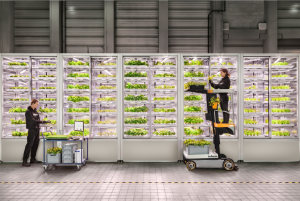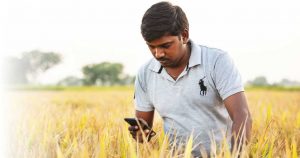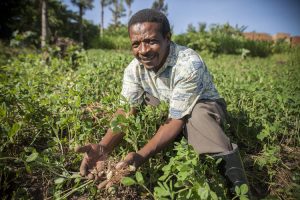By 2050, farmers will need to increase food production by 70% in order to feed nearly 10 billion people, according to the United Nations’ Food and Agricultural Organisation (FAO). A challenge made harder by degraded soils, and the rise in (ever-worsening) extreme weather events due to climate change.
Fortunately, scientists and pioneers are working tirelessly to come up with solutions to the fast-growing problem. From AI to precision farming, and blockchain traceability to communication networks, we’ve put together a list of our favourite agriculture tech startups, which are leading the way towards a more sustainable future.
1. Ecosia (Founded by Christian Kroll)
Company Name: Ecosia
Founder: Christian Kroll
Product: A search engine that plants trees
Website: https://www.ecosia.org/

Probably the most sustainable company there is, Ecosia is a search engine that plants trees using its ad revenue. Since starting the company in 2009, the startup has planted over 100 million trees in 25 countries, from Brazil to Australia and Senegal to Indonesia.
The company’s raison d’être: to create a greener, better world. It does this by focusing on long-term sustainability, rather than quick-fire solutions. By forming local partnerships and planting trees native to the area, Ecosia is able to improve local opportunities for farming; to provide jobs; reduce desertification; create wildlife corridors; and, of course, reduce CO2 levels.
If that wasn’t enough, the B Corp also powers all of their searches with their own solar panels; promises to never sell your data to advertisers; doesn’t use any third-party trackers; and is totally transparent and accountable, publishing all of their monthly reports and tree planting receipts online.
2. Infarm (Founded by Osnat Michaeli, Erez and Guy Galonska)
Company Name: Infarm
Founder: Osnat Michaeli, Erez and Guy Galonska
Product: Indoor vertical farming
Website: https://www.infarm.com

As topics such as supply chain fragility and ecological uncertainty are shoved into the limelight, alternative farming solutions are having a moment. Infarm, the indoor vertical farming startup, has thrived over the past year, raising $170m (£131m) in the first close of a recent Series C funding round, which is expected to reach over $200m (£154m).
The farms consist of vertical, modular units which are placed in restaurants and supermarkets, where customers can pick the herbs, lettuces and vegetables fresh from the shelves. The units are then connected to a central cloud-based farm-brain, which collects data on the optimal amount of light, water, and nutrients.
Infarm claims their precision farming approach uses 99.5% less space than soil-based agriculture, 95% less water, 90% less transport and zero chemical pesticides. On top of this, 90% of the electricity used in the process is from renewable sources and the company has set a target to reach zero emission food production next year.
The farms can be found in Marks & Spencer and Selfridges in the UK, as well as retailers across Germany, France, Luxembourg, Switzerland, the USA, Canada, Denmark, the Netherlands and Japan.
3. Ÿnsect (Founded by Alexis Angot)
Company Name: Ÿnsect
Founder: Alexis Angot
Product: Insect-based animal feed
Website: http://www.ynsect.com

Ÿnsect, a tech startup that produces insects for fertiliser and animal feed, announced on Tuesday that it had raised £285 million ($372M; €314M) to open the world’s largest insect farm. This is the largest amount of money ever raised by an agtech startup outside of the US, and means that the total amount received (£325M; $425M; €359M) is more than the entire sector has raised put together.
With the funding, the French startup plans to complete the construction of the robotically produced insect farm in Amiens, France by 2022, and to increase its production of mealworm from 22,000 tons per year to 100,000 tons.
4. Plantix (Founded by Rob Strey and Simone Strey)
Company Name: Progressive Environmental and Agricultural Technologies (PEAT GmbH)
Founder: Rob Strey and Simone Strey
Product: AI diagnosis of plant disease
Website: https://plantix.net

Plantix is an AI-powered app that diagnoses plant diseases. Created by German power couple Simone and Rob Strey in 2015, the app has helped over 10 million farmers with their crops, the majority of whom live in India.
After uploading photos of the diseased plant on the app, an algorithm checks for diseases, nutrient deficiencies and pests, and then sends tips to the user for treatment. Farmers and experts can then compare experiences and share useful information through the social network.
In April, the company took over the Zurich-based startup Salesbee, which has built a platform to digitalise agriculture markets, and hopes to use the tool to further expand in India and Southeast Asia.
5. Wefarm (Founded by Kenny Ewan)
Company Name: Wefarm
Founders: Kenny Ewan
Product: Offline farming network and marketplace
Website: https://wefarm.co

Wefarm is a network and marketplace for small-scale farmers. While the company’s headquarters are based in London, the platform is mostly used in developing economies, where there are millions of small-holding farms that aren’t overseen by large agricultural businesses. Since their launch in 2015, the startup has grown to include over 2 million users, with more than 40,000 questions and answers being shared every day.
The network can be used offline, via SMS, empowering farmers living in more remote areas to share information and to connect with local suppliers and services. With this knowledge, farmers are able to tackle the effects of climate change, increase their yields, gain a better understanding of pricing and source the best quality seeds, fertiliser, and loans.
6. Air Protein (Founded by John Reed)
Company Name: Air Protein
Founders: John Reed
Product: Protein made from elements in the air
Website: https://www.airprotein.com

Last November, Air Protein hit the headlines for successfully creating the first ‘air-based meat’. An idea originally floated by NASA as a way to produce food on long space missions, the ‘meat’ is made using carbon dioxide, oxygen, nitrogen, water and mineral nutrients. By using a fermentation process similar to making yoghurt, the company has created a protein that is rich in vitamins and takes mere days to make. A combination of pressure, temperature, and culinary techniques are then applied to give the protein characteristics of pork, poultry, beef or seafood.
Since the starter culture used for the meat is grown in water, it does not need any arable land. This means it is not dependent on weather conditions or seasons, leading to a more resilient supply chain.
More from Startups
- Key Advances in eCommerce
- Open Source Intelligence Tech Startups In 2024
- Brain Implants And Startups Tackling Depression At The Source
- Tips From Taylor: What Taylor Swift Can Teach Entrepreneurs About Branding
- Strategies To Help Influencers Increase Their Revenue
- Startups Helping Visually Impaired
- Top Startups In Exeter To Keep An Eye On
- Startup Of The Week: Temper
7. Fishcoin (Founded by Tashia Tucker, Louis Alderson-Bythell, and Greg Orrom Swan)
Company Name: EachmileTechnologies
Founders: Tashia Tucker, Louis Alderson-Bythell, and Greg Orrom Swan
Product: Blockchain-based seafood traceability platform
Website: https://fishcoin.co
As governments and consumers start to ask where our fish is being sourced from, the seafood industry is struggling to find the answers. This is because more than 90% of the world’s seafood comes from small scale producers in developing nations, and we do not have an adequate system in place that accounts for traceability. Fishcoin works to solve this problem by collecting data about the catch from fishermen through to retailers, and offering microtransaction payments via blockchain in return. The company claims this process will make data more transparent and secure, and that it will lead to waste reduction and a more sustainable industry.
8. ApisProtect (Founded by Fiona Murphy)
Company Name: ApisProtect
Founder: Fiona Murphy
Product: Beehive monitors
Website: https://www.apisprotect.com
ApisProtect creates machines that alert beekeepers to unusual activity in their hives, such as disease or invasive pests. A sensor monitors temperature, humidity, carbon dioxide, sound and movement, and feeds the data back to the control centre in Cork, Ireland via the cloud. This is then processed and a message is sent to the beekeepers, telling them which hives need help.
The company currently monitors 20 million honey bees around the world, training their algorithm with data gathered from beekeepers in the UK, Ireland, the US and South Africa. ApisProtect turns the data’s findings into digestible information and shares it through the business communication channel Slack.
9. LettUsGrow (Founded by Charlie Guy)
Company Name: LettusGrow
Founder: Charlie Guy
Product: Aeroponic vertical farms
Website: https://www.lettusgrow.com
Bristol-based startup LettusGrow creates aeroponic container farms. These look like big fuschia-coloured shipping containers, which hold rows of leafy greens, salads or herbs. Instead of using soil, the roots of each plant are suspended in a nutrient-dense mist. The company claims this leads to a 95% reduction in water usage versus open-field farming.
Usually, fresh produce needs to be imported out of season, often travelling hundreds of miles to reach consumers. These containers counter this problem, bringing fresh food to local consumers all year round.
10. Olombria (Founded by Tashia Tucker, Louis Alderson-Bythell, and Greg Orrom Swan)
Company Name: Olombria
Founders: Tashia Tucker, Louis Alderson-Bythell, and Greg Orrom Swan
Product: Flies
Website: https://www.flypollination.com

Pollination is crucial for our food supply. But sadly, the bees that do most of this work are under threat due to habitat loss, pollution, pesticides and disease. London-based agtech startup Olombria has been looking into this problem, and has found a solution: flies.
According to Olombria, flies carry out 30% of all pollination, and even more in cities. The reason this number is not higher? Flies frequently get distracted and wander off, never completing the pollination process between plants. Olombria has found a way around this, by setting up different chemical signalling devices in a field or orchard, and then activating them one by one via a cloud-based system. Hoverflies are then lured from one node to another, pollinating as they go.
The project, originating from the Royal College of Arts entry to the 2017 Biodesign Challenge, now has around 50 devices set up in the UK and the US.



